2023 Notre Dame Religious Liberty Summit: Day 3 Recap
During the final day of the 2023 Notre Dame Religious Liberty Summit, panels included discussions on living up to FoRB (freedom of religion or belief) commitments, the rise of persecution against religious minorities, responses to the rise of autocracy, engaging with the UK’s Parliamentary APPG groups, and rebuilding faith communities after COVID.
Last evening at the gala and award dinner we presented the 2023 Notre Dame Prize for Religious Liberty to Lord David Alton of Liverpool. In addition, the 2023 Religious Liberty Scholarship Award was presented to John E. Coons, the Robert L. Bridges Professor of Law (Emeritus) at the University of California, Berkeley.
THURSDAY, JULY 13
PANEL 1
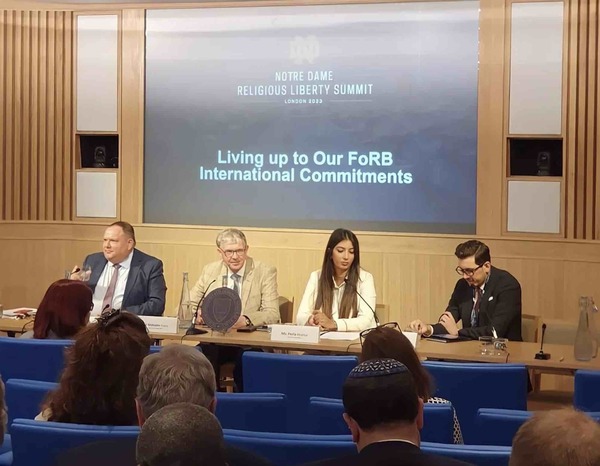
Living up to Our FoRB International Commitments
The Q&A discussion with the panelists and attendees addressed the following topics: if the acronym FoRB is useful, failures to live up to our FoRB commitments, best practices, and ambitions for the future.
“Freedom of religion or belief is a complex and elusive matter. It is hard to pin down and understand. Sometimes, in academic literature, FoRB is a way to deploy the acronym as a way of avoiding more meaningful engagement with the subject.”
Professor Mark Hill KC, Notre Dame London Law Programme
“I don’t really like the expression, ‘freedom of religion or belief,’ which juxtaposes religion and belief in a somewhat oppositional way. And that idea is not always helpful. It is as if we are avoiding the word 'religion.' FoRB is still seen as something that needs explaining or justifying. You get responses when you raise questions on religion or belief, and you simply don’t get those in other contexts … things you would never say in relation to people espousing any other rights.”
“The real solution is from people, and I think that’s hugely positive.”
Sir Malcolm Evans, Regent’s Park College, Oxford
“Rather than getting caught up in semantic debates, I tried to focus on substantive issues and whether individuals are truly able to practice their natural rights without going into the details.”
“It is quite sad to think that Lebanon went from co-drafting the Universal Declaration of Human Rights to segregating people based on their faith.”
Perla Khattar, University of Notre Dame
“‘Freedom of religion or belief’ is a more accessible expression for people not familiar with the FoRB acronym. When freedom of religion or belief is not considered a right, only a privilege or a political interest, it can be manipulated by different actors in society.”
“What I see as the future in this area is more multi-stakeholder approaches to tackle violations of freedom of religion or belief. The primary responsibility to protect freedom of religion or belief lies with the state. However, non-state actors — such as academia, civil society, and religious leaders — also have an essential role in defending freedom of religion for everyone.”
Dr. Thiago Alves Pinto, University of Oxford
PANEL 2A
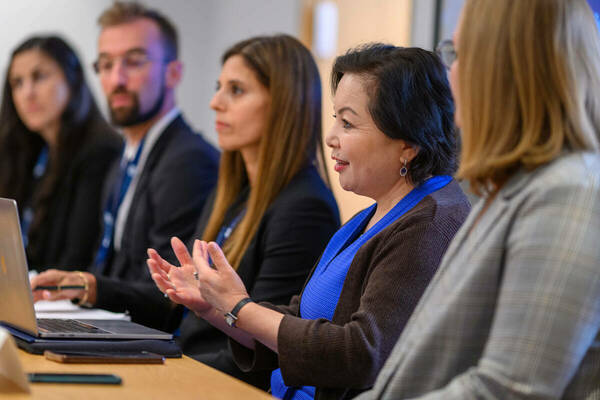
The Rise of Persecution Against Religious Minorities
“The root cause of displacement is due to religious persecution, and then in major host countries, you have people who are being targeted specifically because of their religion.”
Kimberlie Orr, International Center for Law and Religion Studies
“There’s also a crimes-against-humanity treaty that’s under consideration now. I see that we’ve moved the dialogue just by speaking to different parliaments and policymakers. At the end of the day, states have the most power, not institutions or courts that take decades to resolve disputes or to prosecute these crimes. … The way we’re going to stop these mass atrocities is by coming up with innovative ways and using the power of states.”
Yonah Diamond, Raoul Wallenberg Centre for Human Rights
“We don’t have to operate in silos of thought when we talk about religious freedom and religious liberty. There is actually common ground. The community focal point is so significant. The people have a voice. There has to be a reform of thought in order to bring people together.”
Amrith Aakre, The Sikh Coalition
“Chinese state documents described Uyghurs as rats and Islam as a virus and a mental illness. … The Uyghurs have been victims for centuries — branding the Uyghurs as Muslim terrorists so people think that they’re troublemakers. … Most of the concentration camp survivors all said the same thing: The main reason that these people were detained was to denounce their identity, specifically to denounce their religion."
Rahima Mahmut, World Uyghur Congress and Stop Uyghur Genocide
“To be a global citizen, the obligation is knowing people you love. The point here is that global citizenship stems from the proximity principle. The more interactions and the closer you get to people who think differently than you, the more you will internalize what it means to be a global citizen. … Take it upon yourself to love someone from these communities, and you will feel obligated to act.”
Rachel Miner, Bellwether International
PANEL 2B
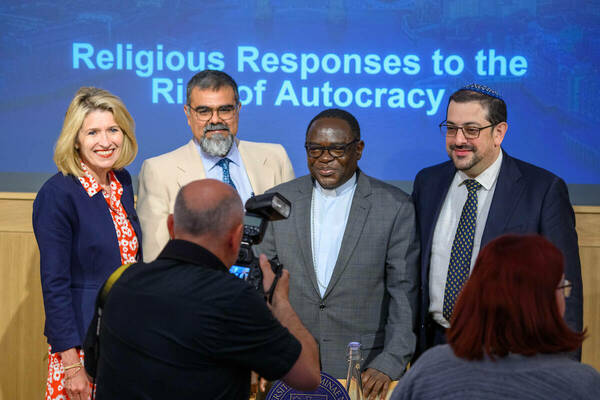
Religious Responses to the Rise of Autocracy
“Never again shall a sovereign state be freely allowed to murder its own people, to deprive them of liberty, to deprive them of justice. … Unless we stand up — and not when there’s a massive tragedy, but on a day-to-day basis — and work together to form coalitions, to form communication, and to form the necessity of a civil society, then we are sleepwalking into the precipice of autocracy.”
Rabbi Alex Goldberg, University of Surrey
“I am of the view that we should focus more on measurable changes in our social and economic lives. … If we were to democratize development, then we’ll be able to develop democracy and give the poor and young people religion.”
Bishop Matthew Kukah, Catholic Diocese of Sokoto
“Wherever we are in the world, religious believers should seek to be light, leaven, and salt. We should try to offer political neutrality, take care to protect our institutional independence and integrity in our humanity work, and be guided by principles of love, focusing on those whose needs are most profound.”
President Camille Johnson, The Church of Jesus Christ of Latter-day Saints
“What we heard from Rabbi Alex Goldberg is religious liberty should lead to a solidarity that helps us hold our ground and slowly gain ground. … Then, we heard [from Bishop Kukah] that we have more agency than we realize. The autocracy-democracy binary is too simplistic. We need to focus on outcomes. Finally, do the work and leave some things to God.”
Professor Mahan Mirza, University of Notre Dame
PANEL 3A
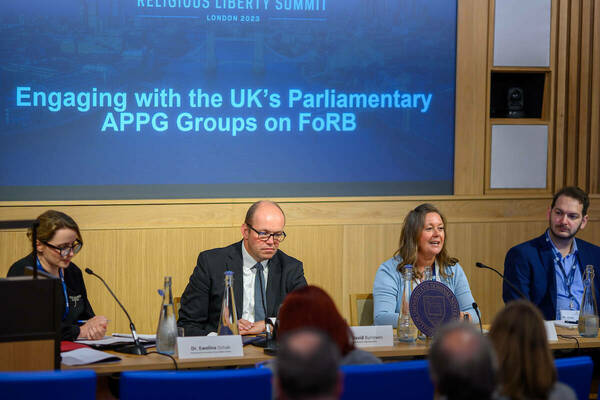
Engaging with the UK’s Parliamentary APPG Groups on FoRB
Dr. Ewelina Ochab, programme lawyer for the International Bar Association’s Human Rights Institute, moderated the panel.
“For me, the role of the APPG is to be the advocate for people who do not have access to justice, do not have access to the international community.”
Andy Bailey, APPG FoRB & APPG Prevention of Genocide - Houses of Parliament
“Internationally, we have the International Panel of Parliamentarians for Freedom of Religion or Belief (IPPFoRB). The Parliamentary can be a voice. There’s still a role to make sure that we collaborate internationally.”
David Burrowes, UK Prime Minister’s FoRB Envoy Office
“What do I love the most about this? Saving lives, seeing the efforts that parliamentarians give above and beyond to champion what matters most to them. It’s also working with people like Notre Dame, the Baháʼí, Bellwether, the Church of Jesus Christ of Latter-day Saints, who also save lives.”
“It is our responsibility to find the best way, to ask the best questions in the issue of freedom of religion or belief. The more questions we ask and bring attention to the government, the more area of concern it’s going to be.”
Julie Jones, APPG ILJA (International Law, Justice and Accountability) and APPG FoRB (International Freedom of Religion or Belief), Palace of Westminster, London
PANEL 3B
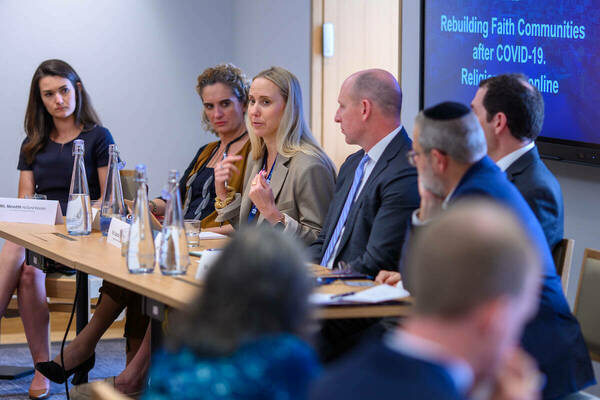
Rebuilding Faith Communities After COVID
Meredith Holland Kessler, staff attorney for Notre Dame Law School’s Religious Liberty Clinic, moderated the panel.
“Religions reached new audiences. … Religions were not only for the believers, not only for the community, but also people came because it was through YouTube. For instance, they could click and be part of something happening in the world.”
Dr. Miriam Diez Bosch, Blanquerna Observatory of Communication, Religion, and Culture
“Religious institutions should be seen as necessary safeguards of freedom in militating against excessive state authority by promoting pluralism in the sense that they grant sources of meaning, belonging, and a moral order to individuals’ lives.”
Joanna Baron, Canadian Constitution Foundation
“But now that the pandemic is over, are things naturally back to normal? Sadly, for some churches, they know otherwise. Recent studies confirmed that after churches closed during COVID, some members never came back.”
Matthew Bowman, Alliance Defending Freedom
“During COVID, they said people who died had to be cremated. This was a massive problem in the Jewish faith. There was no cognizance of the spiritual as a factor — all because people of faith were not at the table when the law was being made.”
Shimon Cohen, The PR Office
“I think the biggest issue is restoration to a commitment to gathering regularly. ... We fell into some bad habits during COVID by retreating too often to our own individual lives and neglecting that collective commitment and necessity for gathering.”
John Huleatt, Bruderhof
GALA & AWARD DINNER
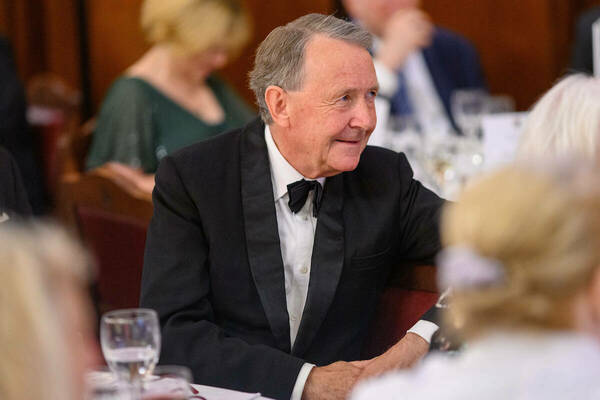
2023 Notre Dame Prize for Religious Liberty: Lord David Alton
Last night, attendees enjoyed a black-tie gala at the Merchant Taylors’ Hall. The 2023 Notre Dame Prize for Religious Liberty was awarded to Lord David Alton of Liverpool, a member of the House of Lords of the United Kingdom, in recognition of his outstanding service preserving religious liberty around the world.
Watch a video about Lord Alton’s life and outstanding career.
A full article about the gala and award dinner is published here.
You may also read Dean G. Marcus Cole’s remarks at the gala.
The Religious Liberty Initiative Scholarship Award was awarded to John E. Coons, the Robert L. Bridges Professor of Law (Emeritus) at the University of California, Berkeley. His recent book, The Case for Parental Choice: God, Family, and Educational Liberty, makes a humanitarian case for parental school choice, seeking to advance social justice and respect the dignity of parents — especially those on the margins.
Read the other daily recaps from the 2023 Notre Dame Religious Liberty Summit:
Originally published by at religiousliberty.nd.edu on July 14, 2023.